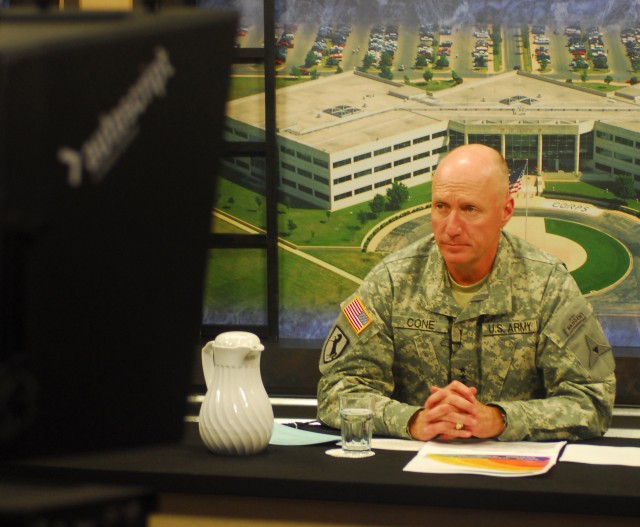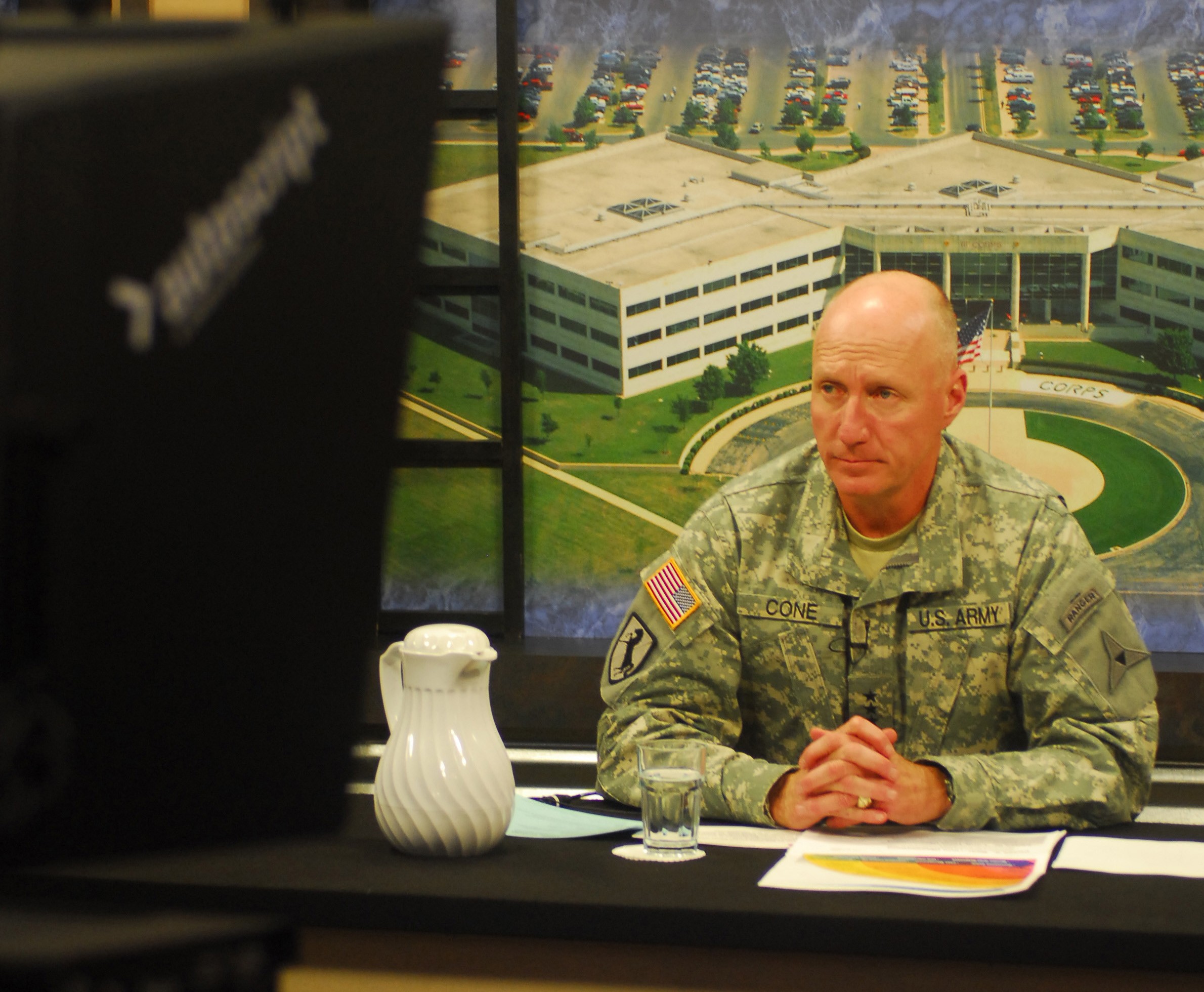
FORT HOOD, Texas -- Lt. Gen. Robert Cone, III Corps and Fort Hood commanding general, announced the formulation by post leaders and health experts of a behavioral health campaign plan addressing the psychological and emotional needs of the community during a special live broadcast Monday night.
During an hour-long live TV Town Hall, the general explained a plan aimed at aiding community members heal in the aftermath of the Nov. 5 shooting spree that left 13 dead and dozens more injured. The broadcast aired on Fort Hood Television, cable channel 10 on the installation, and off-post on the local Public Broadcasting Service affiliate, KNCT-TV from Central Texas College in Killeen.
"We call it a behavioral health campaign plan because we see it as a series of engagements that we will be involved in for quite some time," Cone said. He said the first step was to identify the populations of concern; those people most affected by the events of Nov. 5. Those populations include the survivors of the deceased, those wounded and their families, those exposed to the violence and the community at large.
"What we wanted to do is establish a plan that is comprehensive and addresses the needs of all these folks," he said, noting that behavioral health experts have been called in to assist the installation with their plan as well as sources outside of the Army. "One of the first things we did is, through the Army, consult with Virginia Tech. As many of you know they had a similar tragic situation several years ago and looked at the lessons learned they had had."
Cone said he expects to finalize the plan this week and present it to community leaders and advocacy groups Thursday. The three phase plan will address immediate issues in the wake of the crisis, near-term concerns and the long-term health of Fort Hood's Army community of Soldiers, civilians and their families.
"Frankly, I believe as tragic as this incident may be, there could be some goodness that comes from this," he said, "and that is, in fact, that we could establish a baseline for our real mental health needs here at Fort Hood."
He said one-on-one evaluations and assessments are an important part of the healing process, noting that individual needs vary from person to person. Most importantly, he said, is identifying who needs help. That's where everyone can pitch in.
"First and foremost, seek help if you need it," Cone said. "If you're suffering from the effects of this incident you need to come forward and let us help you with it.
"Look to your left, look to your right and look within and basically determine who needs help," he added. "We've got the resources here right now. We've had a huge surge in the number of behavioral health providers that are available and we can accommodate the number of folks we think will come forward."
Later in the broadcast, Cone was joined by Col. Bill Hill, the garrison commander, Col. Steven Braverman, commander of the Carl R. Darnall Army Medical Center, and Col. Jim Polo, a psychiatrist with more than 29 years of service currently the Army's assistant deputy for health policy in the Pentagon. Polo has been called to Fort Hood to assist the command's efforts to rebound from the tragedy. The panel members took calls for the remainder of the program.
Polo weighed in when the first caller, a mother, asked how she should talk to her child about the Nov. 5 incident.
"The first thing is it's important to be honest with children but you want to make sure that you're talking at that level," Polo said. "One of the things that we've done is we've created a sheet that's being handed out, available through the hospital and child services on how you can specifically answer some of those questions. 'Am I still safe, mommy' Mommy, why were there guns here' Daddy, are you afraid'' Those are all questions that are normal and natural for kids to ask and we have handouts that will help you put that in words that your kids will understand."
Braverman noted that the hospital's Web site has the handout for parents detailing how to talk to children about the tragedy. That handout can be found at www.crdamc.amed.mil. The hospital commander also provided an update on services available.
"Right now we're in that period where we're continuing to take care of Soldiers, civilians and our contractors who affected by the events (Nov. 5) while at the same time resuming normal operations across the post," Braverman said. "That's important as we continue to move forward.
"We want to regain your trust," he said. "That's a big issue for us right now because folks are concerned about what happened. We are here to serve. We served well before and will continue to serve well now."
Several callers indicated the anger and frustration lingering within the military community in the wake of the Nov. 5 shootings. One woman asked, simply, how to rid herself of the anger she's feeling.
"I go to the gym," Cone said. "That's how I handle it, but I'll turn it over to the doc. If you have anger, that's normal," Polo said. "That is a normal response to an event that, quite frankly, most of us wish had not occurred. But to go with what Gen. Cone said, people handle anger in different ways. One of the best ways to get that anger out is to share it with other folks so that they know what you're feeling. Our concern when people have anger is not that they have anger, but if they bottle it up and then for whatever reason they explode.
"It goes back to the original idea of if you think you're having a problem, If you think you're having difficulty, if there's something that's bothering you and anger might be one of those things bothering you, let somebody know," Polo advised. "Come in and let us help you work through that anger."
Concerns about safety and security were also common among the calls taken. The installation's commanding general told one caller who asked for more random vehicle inspections at the post's gates that the command is reviewing security procedures and expects changes to be announced soon.
"That's one of the things we're looking at," Cone said. "Normally, the number one thing people would be complaining about is traffic. We've got to take a hard look if that we, as a community, want to pay the price for these random searches. One of the things I'm taking a hard look at is the registration of weapons," Cone added, noting that Soldiers living on the installation must have their weapons registered. But with more than 70 percent of the population living off the installation, the general said the command is looking at what can be done to register all weapons of individuals living and working on the installation.
Cone concluded the broadcast noting, as Braverman did earlier, that the restoration of trust is a must for the community to heal.
"Remember, it's all about trust," Cone said. "It's about restoring trust in our Soldiers, in our family members, in our larger Fort Hood community and among our great civilians.

Social Sharing